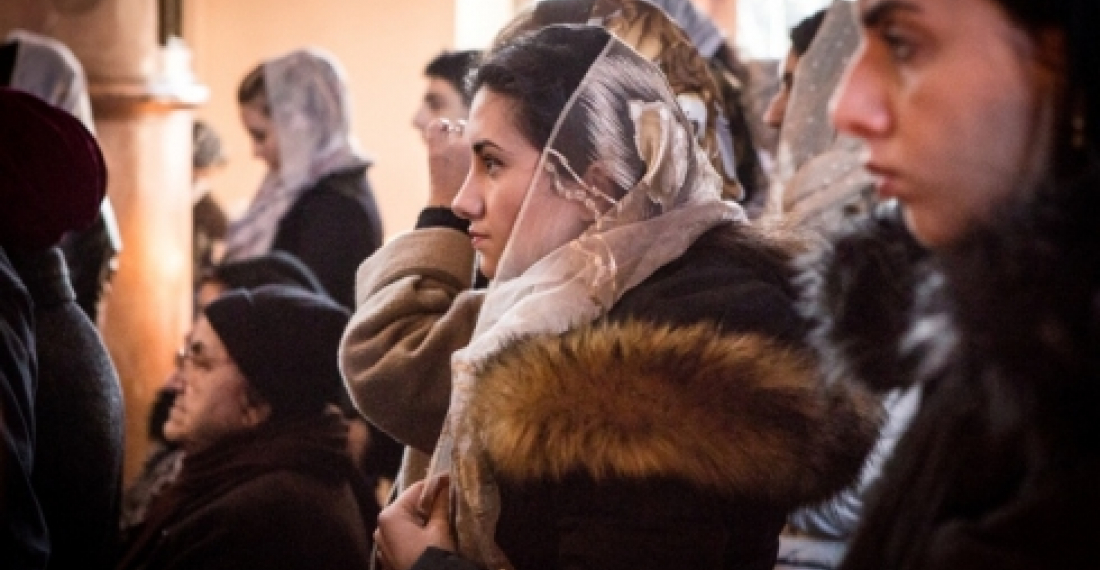Shock at the cold-bloodied murder of an Armenian family in Gyumri by a renegade Russian soldier continues to resonate among Armenian communities throughout the world. Joseph Alexander Smith reports from Tbilisi for commonspace.eu on how the community in the Georgian capital have reacted to the tragedy. The Armenian community in Tbilisi gathered on Sunday 18 January to commemorate the six family members who were killed in the northern Armenian city of Gyumri a week ago. Faithful of the Armenian Apostolic Church in Tbilisi attended a packed Sunday morning Liturgy, which was followed by a traditional memorial service for the six members of the Avetisyan family who were killed, apparently in cold blood, on Monday 12 January. The suspected killer, Valery Permyakov, is a Russian soldier who was serving at the 102nd Russian military base in Gyumri. His handover to Russian military authorities, who are investigating the case, has sparked outrage in Armenia, with sustained protests in both Gyumri and the Armenian capital Yerevan demanding that he be handed over to Armenian law enforcement agencies. The memorial service was held at Tbilisi's St Etchmiadzin Church in Avlabari, during which Bishop Vazgen, leader of the Armenian Apostolic Church's diocese in Georgia, spoke about the importance of praying for the souls of those who were killed. In a case which has shocked Armenian communities around the word, Seryozha Avetisyan was killed along with his wife, son, daughter-in-law, daughter and 2 year-old granddaughter. A six month-old baby boy was also recovered from the murder scene with severe stab wounds and was taken to hospital in a critical condition. "We're here to commemorate what happened in Gyumri - the murder of a family by a Russian serviceman - by holding a memorial service after Holy Liturgy" Father Narek, a priest serving at the church, told Commonspace.eu. "Memorial services have already been held in Armenia and we decided to hold one on Sunday when there would be more of the local faithful present." On Saturday, up to 60 Georgians and local Armenians attended a memorial demonstration outside the Armenian Embassy in Tbilisi, lighting candles and laying floral tributes. The demonstration was organized on Facebook by social sciences student Giorgi Chinchaladze and was attended by a small number of public figures, including Sergo Ratiani, an MP for the opposition UNM party. Georgia's deputy Ministry of Foreign Affairs, Davit Jalagania, delivered a statement of condolence on Saturday, after the "shocking and terrible" attack. "... In the 21st century, many tragic incidents have occurred, but since we are a neighboring, friendly country, a tragedy of this cruelty is probably one of the most remarkable" Jalagania said. "We sincerely express our condolences to the families and their loved ones. We also believe that the offender will be prosecuted and appropriate legal measures will be implemented. We are confident that justice will prevail and the offender will be punished accordingly." The issue of how Permyakov will be tried and under which jurisdiction has been the subject of intense debate in Armenia, straining relations with its ally Russia. Ever since Permyakov's handover to Russian military authorities, there have been protests outside Armenian and Russian institutions in Gyumri demanding that the Russian soldier be handed over to Armenian prosecutors. According to eyewitnesses, protesters in Gyumri threw coins at the Prosecutor's Office there, implying that the Armenian government had 'sold' its internal sovereignty to the Russians. "The Armenian government should be the one to undertake this process, not the Russian government" said Hasmik Tonapetyan, a native of Gyumri studying in Tbilisi who also attended the memorial service at St Etchmiadzin church. "The people want the government to take responsibility and to judge this soldier according to Armenian law." "The image of a soldier is of one who protects not of one who murders. Also they still haven't found out why the members of this family and why this solider. Who kills people who are asleep in bed? This is really shocking." The long-term ramifications of the case are hard to predict. While Armenia, which recently entered the Russian-led Eurasian Economic Union, is unlikely to radically re-negotiate relations with its powerful military ally, the Armenian authorities are facing a level of public outrage which has rarely been seen since independence from the Soviet Union. There may also be a question mark over the future of Russia's military presence in Armenia. In a similar case in 1999, two Russian soldiers from the base went on a drunken killing spree in Gyumri. In 2013, two local youths were killed by a landmine at a shooting range used by the base. "The fact is that this has broken not the friendship between our countries, but the trust" says Tonapetyan. "This base is supposed to protect the civilians living there but this is the second time a soldier has killed peaceful civilians ... it's just repeating itself 16 years later!" source: Joseph Alexander Smith filed this report from Tbilisi for commonspace.eu photo: The memorial service for the murdered family in Gyumri held at the St Etchmiadzin Church in the Avlabari district of Tbilisi on Sunday, 16 January 2015. (picture credit: Helen Osborne)







